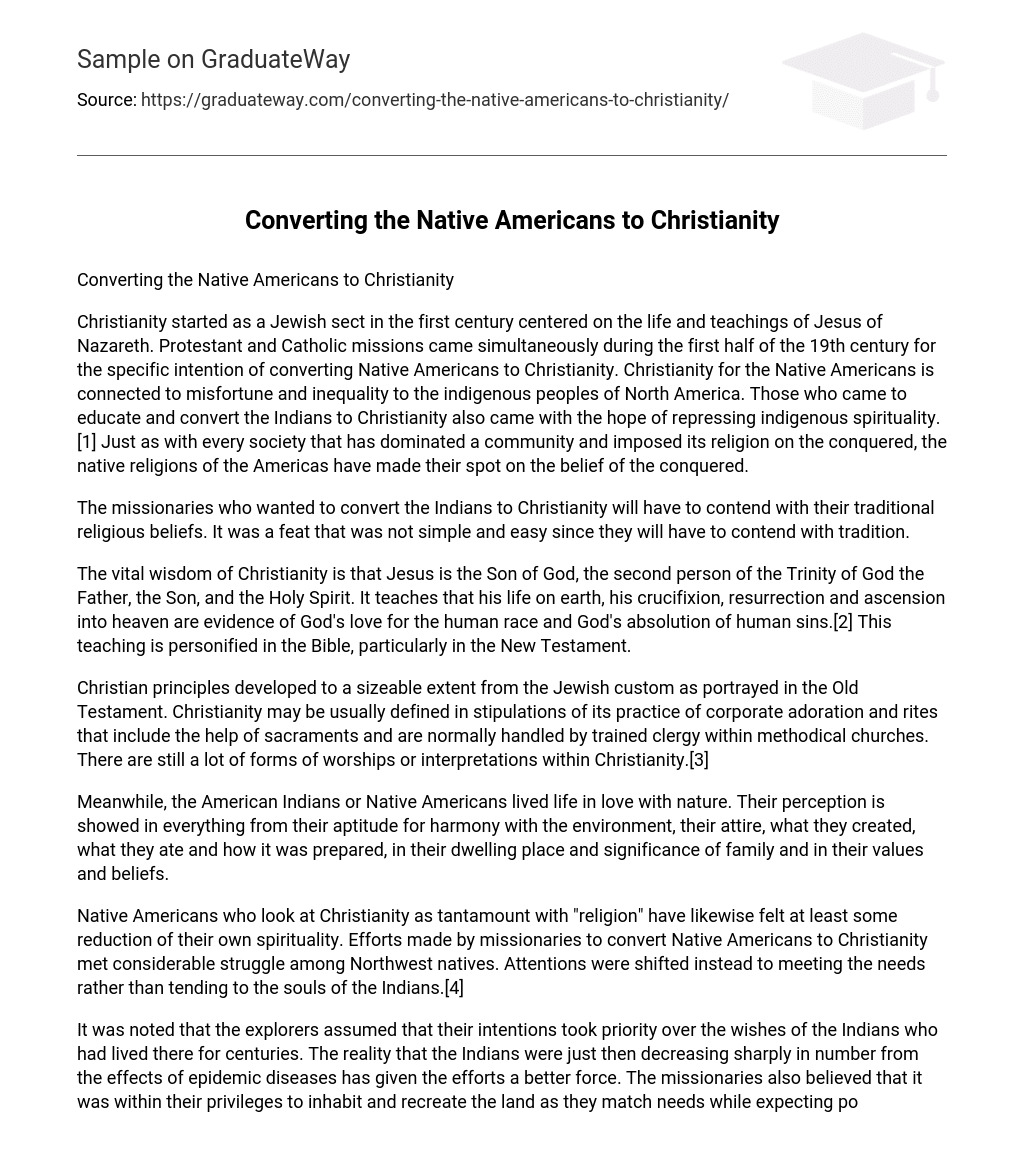Christianity started as a Jewish sect in the first century centered on the life and teachings of Jesus of Nazareth. Protestant and Catholic missions came simultaneously during the first half of the 19th century for the specific intention of converting Native Americans to Christianity. Christianity for the Native Americans is connected to misfortune and inequality to the indigenous peoples of North America. Those who came to educate and convert the Indians to Christianity also came with the hope of repressing indigenous spirituality.[1] Just as with every society that has dominated a community and imposed its religion on the conquered, the native religions of the Americas have made their spot on the belief of the conquered.
The missionaries who wanted to convert the Indians to Christianity will have to contend with their traditional religious beliefs. It was a feat that was not simple and easy since they will have to contend with tradition.
The vital wisdom of Christianity is that Jesus is the Son of God, the second person of the Trinity of God the Father, the Son, and the Holy Spirit. It teaches that his life on earth, his crucifixion, resurrection and ascension into heaven are evidence of God’s love for the human race and God’s absolution of human sins.[2] This teaching is personified in the Bible, particularly in the New Testament.
Christian principles developed to a sizeable extent from the Jewish custom as portrayed in the Old Testament. Christianity may be usually defined in stipulations of its practice of corporate adoration and rites that include the help of sacraments and are normally handled by trained clergy within methodical churches. There are still a lot of forms of worships or interpretations within Christianity.[3]
Meanwhile, the American Indians or Native Americans lived life in love with nature. Their perception is showed in everything from their aptitude for harmony with the environment, their attire, what they created, what they ate and how it was prepared, in their dwelling place and significance of family and in their values and beliefs.
Native Americans who look at Christianity as tantamount with “religion” have likewise felt at least some reduction of their own spirituality. Efforts made by missionaries to convert Native Americans to Christianity met considerable struggle among Northwest natives. Attentions were shifted instead to meeting the needs rather than tending to the souls of the Indians.[4]
It was noted that the explorers assumed that their intentions took priority over the wishes of the Indians who had lived there for centuries. The reality that the Indians were just then decreasing sharply in number from the effects of epidemic diseases has given the efforts a better force. The missionaries also believed that it was within their privileges to inhabit and recreate the land as they match needs while expecting power over the Natives.
Educating and converting them to Christianity was indeed an effort that involved tremendous efforts that were not plain and painless. There were missionaries who met their untimely deaths for doing so. But Christianity will tell us that the love of nature is also getting close to God. Nature is among God’s wonderful creations and so it is but natural to love everything God created. It is not about worshiping nature but worshipping something that is created by God.
Christianity also tells us that love of God is love of His creations. And what is God’s greatest creation? Of course, man. When they were converted to Christianity, Native Americans were also taught the value of loving and respecting God’s creations thereby seeing the unity of two principles.
Sources
New Perspectives of the West (May 6, 2006). http://www.pbs.org/weta/thewest/people/s_z/whitman.htm
Chambers, Mortimer; Crew, Herlihy, Rab, Woloch (1974). The Western Experience Volume II: The Early Modern Period, 1st, Alfred A. Knopt, Inc. ISBN 0394317343
J. Lebreton and J. Zeiller, A History of the Early Church (4 vol., 1944—46; repr. 1962)
[1] Chambers, Mortimer; Crew, Herlihy, Rab, Woloch (1974). The Western Experience Volume II: The Early Modern Period, 1st, Alfred A. Knopt, Inc. ISBN 0394317343
[2] J. Lebreton and J. Zeiller, A History of the Early Church (4 vol., 1944—46; repr. 1962)
[3] op cit
[4] New Perspectives of the West (May 6, 2006). http://www.pbs.org/weta/thewest/people/s_z/whitman.htm





